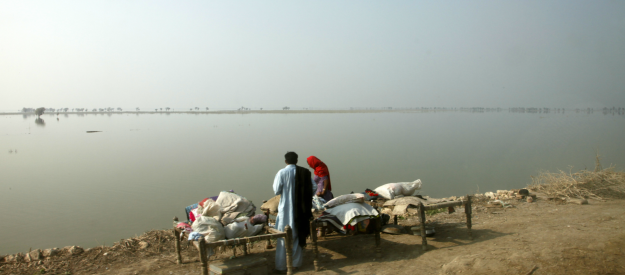"We are losing our attitude of wonder, of contemplation, of listening to creation and thus we no longer manage to interpret within it what Benedict XVI calls 'the rhythm of the love-story between God and man.'"
+ Pope Francis
Laudato Si': "They bear the loss"

"There has been a tragic rise in the number of migrants seeking to flee from the growing poverty caused by environmental degradation. They are not recognized by international conventions as refugees; they bear the loss of the lives they have left behind, without enjoying any legal protection whatsoever. Sadly, there is widespread indifference to such suffering, which is even now taking place throughout our world. Our lack of response to these tragedies involving our brothers and sisters points to the loss of that sense of responsibility for our fellow men and women upon which all civil society is founded." Laudato Si' (25)
June 20th is World Refugee Day—a day to acknowledge realities that we should be acknowledging all year long and that we should be seeking to alleviate. As the pope reminds us in Laudato Si', people flee from their home for environmental reasons and climatological changes as well as political ones. And sometimes these reasons can be hard to tell apart.
The international community struggles with how to classify those displaced for environmental reasons.
Just fifteen years ago there was debate over whether such a reality existed. As Pope Francis reminds us in Laudato Si', even today international law does not grant the same protections to those displaced for environmental or climate-related reasons as they do for those displaced for political causes.
The big concern is that as the number of extreme weather events rises throughout the world, and as areas that were once lush become arid due to a lack of rainfall and evaporating glacial feed of water supplies, the number of those of us displaced will rise and the suffering will be immense.
While the perception in much of the developed world is that displacement and/or large influxes of refugees is something that only happens to other people and in other places, that’s not the case.
In the United States, whole communities were resettled after Hurricane Katrina in 2005. Devastation from 2012’s Superstorm Sandy did much the same in coastal areas of New York and New Jersey. On a micro but personal level, my home town saw historic flooding in March of 2010—with the local river cresting at six feet over the record stage, which occurred just two weeks prior. Many people I know were displaced for days, weeks, and months. Most recently, parts of Texas and Oklahoma have seen similar flooding from sudden, extended, and unusually intense rain events.
And of course, there are the questions of what happens when drought—as in places in China, Africa, and the Western United States—forces workers and families to find new lives elsewhere.
These situations are already occurring and aid agencies are scrambling to prepare for increases in the number of environmental and climate refugees in already stressed regions, as well as in areas that aren’t accustomed to such dislocation.
Pope Francis is aware of all this through the life of the Church—from aid agencies, bishops, and religious. And so he has rightly called this to our attention in Laudato Si'. God bless him for doing so.
The question for us now is, will we participate in “widespread indifference to such suffering?”
There are ways we can help. Prayer, of course, is always the most powerful means of changing hearts, finding strength, and changing worlds. Direct donations are needed, too. Badly. Here you may wish to donate to Catholic relief agencies like Caritas and Catholic Relief Services. For those of us who can, direct aid is needed on the front lines, and perhaps God is calling you to that in your own community or by working with existing professional efforts. The other is education and advocacy. We have the responsibility to learn about these realities ourselves and we have the duty to share them with others.
Lastly, in all this, there is a lesson here about reading social encyclicals.
A few sentences in just one paragraph is often the result of a great level of research and on-the-ground knowledge, thanks especially to the Church’s aid agencies. Thus a few words here and there in an encyclical often become an invitation to enter large and complex realities—ones that demand our personal and communal attention, and that ultimately must turn our attention to Christ if we truly seek lasting solutions for the troubles of our common home.
[Ed. Note: Catholic Ecology will be blogging daily on particular elements within Laudato Si' until the Feast of SS Peter and Paul.]
Photo: Flicker/DFID - UK Department for International Development


















